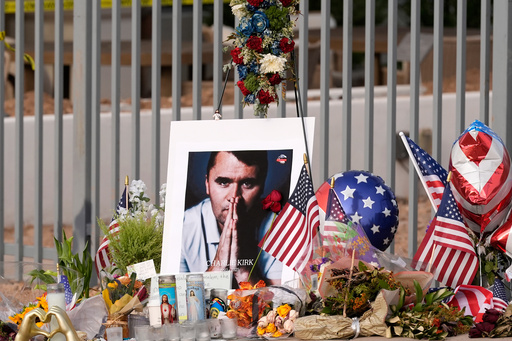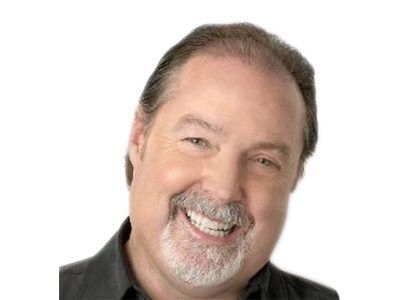Younger Americans less concerned about political violence and free speech threats: AP-NORC poll
News > Top Stories

Audio By Carbonatix
4:08 AM on Wednesday, October 29
By JONATHAN J. COOPER and AMELIA THOMSON-DEVEAUX
WASHINGTON (AP) — In the tumultuous political climate marked by this year's assassinations of conservative activist Charlie Kirk in Utah and a Democratic legislator in Minnesota, younger adults are less worried about political violence than older adults, according to a new AP-NORC poll.
About 4 in 10 U.S. adults are concerned about political violence directed at conservatives or liberals, the poll from The Associated Press-NORC Center for Public Affairs Research found, but anxiety about violence on either side of the political spectrum is lower among young adults.
There’s also a substantial partisan divide, with Republicans and Democrats expressing high concern about violence against their own side — and fewer saying they're worried about violence against the other side.
When it comes to fundamental rights, U.S. adults are most likely to say that freedom of speech and freedom of the press are facing a major threat. Fewer Americans see threats to the right to vote and the right to bear arms.
“I worry because anytime political violence happens, it seems like it can be a snowball effect,” said Ryan Striker, a 34-year-old music teacher in Manchester, New Hampshire, who is liberal but politically independent and opposes President Donald Trump.
In June, state lawmaker Melissa Hortman and her husband were shot to death in their home and state Sen. John Hoffman and his wife were wounded in what the Justice Department called the shooter's “calculated plan to inflict fear and violence upon Minnesota elected officials and their families.” Kirk was shot dead in September while addressing an audience on the campus of Utah Valley University in what authorities also called an act of political violence.
The poll found that 44% of U.S. adults are “extremely” or “very” concerned about political violence directed at conservative political figures or organizations. A similar percentage, 41%, are concerned about violence directed at liberal figures and groups.
There’s a large divide among generations, however.
About half of adults age 60 and older are highly concerned about political violence directed at conservatives or liberals, compared with about 3 in 10 adults under 30.
“I remember Kent State. I was around then,” said Tony DiGiovine, a 74-year-old musician and retired electrical engineer from Phoenix and a Democrat. “The National Guard really isn’t trained to patrol our streets. Neither are our armed forces. Something’s going to go wrong.”
The National Guard shot and killed unarmed students who were protesting the Vietnam War at Kent State University in 1970.
There’s a similar generational pattern when it comes to concern about limitations on liberals’ and conservatives’ free speech.
About 4 in 10 U.S. adults overall are “extremely” or “very” concerned about threats to conservatives’ or liberals’ free speech. But among adults ages 60 and older, about half are highly concerned about threats to conservatives’ free speech, while only about one-quarter of adults under 30 say the same. There’s a smaller but still substantial gap for liberals.
Asked whether various fundamental rights were under threat, the poll found about half of U.S. adults see a “major” threat to freedom of speech and about 4 in 10 say the same about the freedom of the press. Fewer, about 3 in 10, say there are significant threats to the right to vote and the right to keep and bear arms.
There was no age divide among Americans who see a “major” threat to free speech. The finding suggests that younger adults do think freedom of speech is threatened, but they’re less personally concerned about how it could affect liberals or conservatives than older adults.
“It’s concerning that we seem to be getting to the point where we stop talking, we stop compromising, and people vilify their opponents,” said Craig Tenhoff, 58, an independent of Simi Valley, California.
Only about 2 in 10 adults under 30 say the right to vote faces a “major” threat, compared with about 4 in 10 adults ages 60 and older.
U.S. adults who identify with a party are more likely to be worried about violence against organizations or figures that share their ideology, while most independents are not highly concerned about political violence in general.
About 6 in 10 Republicans are “extremely” or “very” concerned about political violence directed at conservative political figures or organizations, while only 27% are highly concerned about political violence directed at liberal political figures or organizations.
On the other hand, about 6 in 10 Democrats are “extremely” or “very” concerned about political violence directed at liberal political figures and organizations, while 38% are highly concerned about political violence directed at conservatives.
These findings are particularly pronounced among people at extreme ends of the political spectrum: Conservative Republicans and liberal Democrats are much likelier to be concerned about violence directed at their side than more moderate members of their coalition.
About one-quarter of independents are “extremely” or “very” concerned about political violence directed at conservatives or liberals.
Max Anderson, an independent who describes himself as liberal, said he’s concerned about violence from across the political spectrum.
“I think a lot of people my age aren’t generally doing good right now,” said Anderson, a 23-year-old college student in Fort Collins, Colorado. “So I think all of a sudden, those more extreme avenues of action just feel like a better option.”
There are major partisan divides about the extent to which freedom of speech, freedom of the press and the right to vote are currently threatened. About two-thirds of Democrats say freedom of speech and freedom of the press are facing a “major threat,” while only about 3 in 10 of Republicans say this about freedom of speech and about 2 in 10 say this about freedom of the press.
Jeff Milligan, a 72-year-old Republican from Logan, Ohio, said he's more concerned about violence directed at conservatives than liberals. Milligan used to be more worried about threats to fundamental rights than he is now.
What changed for him?
“President Trump was elected," he said.
___
This story has been corrected to reflect that one Democratic lawmaker in Minnesota was assassinated, not multiple lawmakers.
___
Cooper reported from Phoenix.
___
The AP-NORC poll of 1,289 adults was conducted Oct. 9-13, using a sample drawn from NORC’s probability-based AmeriSpeak Panel, which is designed to be representative of the U.S. population. The margin of sampling error for adults overall is plus or minus 3.8 percentage points.







